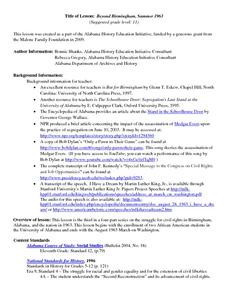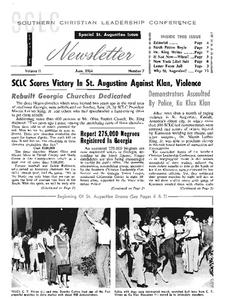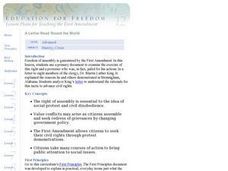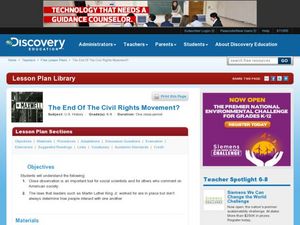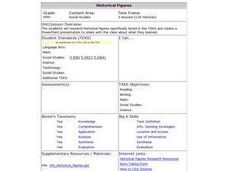K12 Reader
Glossary of Non-Violence
Make sure your class is sure of terminology when referring to the non-violent methods used in the civil rights movement. This glossary includes 19 terms paired with parts of speech and definitions.
Alabama Department of Archives and History
Beyond Birmingham, Summer 1963
The assassination of Medgar Evers. The integration of the University of Alabama. The March on Washington. The "I Have a Dream" speech. Created by the Alabama History Education Initiative, this resource examines how the events that...
Stockton University Wordpress
Civil Disobedience: Is it ever ok to break the law?
As part of a study of civil disobedience, class members read excerpts from the writings of activists who were willing to break the law to protest unjust laws.
Fusco’s English Class
Journal Writing Prompts
Inspire thoughtful journal entries with these detailed journal writing prompts. The resource includes 24 prompts that require learners to write expository, persuasive, and sometimes creative journal entires.
Freedom Archives
Special St. Augustine Issue
The articles and images in the June 1964 edition of the Southern Christian Leadership Conference Newsletter detail the events in St. Augustine that were instrumental in the passing of the Civil Rights Act of 1964. The stirring images and...
National Endowment for the Humanities
The Music of African American History
High schoolers examine role spirituals have played in African American history and religion, examine Harriet Tubman's use of spirituals in her work, explore power of spirituals in Civil Rights Movement, and work with oral tradition,...
Center for Civic Education
The Power of Nonviolence: Change Through Strategic Nonviolent Action
How did major historical figures, such as Henry David Thoreau, Susan B. Anthony, and Mohandas K. Gandhi, explain and defend their beliefs in nonviolence? Your learners will begin by studying the backgrounds of these individuals, and then...
PBS
March on Washington: A Time for Change
Young historians conclude their study of the events that lead up to and the planning for the March on Washington. After examining videos and primary source documents, they consider the civil rights objectives that still need to be...
Curated OER
Understanding the Declaration of Independence
Students work in groups to do a document analyxix of several documents. Students view the Martin Luther King speech, "I Have a Dream." They discuss the Battle of Saratoge. Students give a personal view of the reason the Declaration of...
Civil Rights 50
Civil Rights at 50
The 50th anniversary of the 1963 March on Washington, President Johnson's signing of the Civil Rights Act of 1964, the Voting Rights Act of 1965, and the Immigration and Nationality Act of 1965 provide the backdrop for a series of lesson...
PBS
Malcolm X: Minister and Civil Rights Activist
Any study of the leaders of the Civil Rights Movement would be incomplete without an examination of the life of Malcolm X. Class members view a short biographical video and analyze primary source documents to gain an understanding of the...
Curated OER
Philanthropy Framework
Students become community philanthropists. In this social studies lesson, students learn the definition of philanthropy and apply it to Martin Luther King, Jr. The next day, students complete 3 T-charts for 3 historical figures. Finally,...
Curated OER
A Letter Read 'Round the World
Young scholars examine primary document to examine the concept of free assembly, and analyze Dr. Martin Luther King Jr's letter to the clergy to explain the rationale for this tactic to advance civil rights.
Curated OER
A Box Of Crayons
Students draw self-portraits on die-cut crayon patterns after hearing the poem "A Box of Crayons" in this Art instructional activity for the elementary classroom. The instructional activity is ideal for celebrating Martin Luther King...
Curated OER
Gandhi's Life and Guiding Principles
Second graders investigate philosophy by researching the life of Mahatma Gandhi. In this biographical lesson, 2nd graders listen to a reading of the book "Gandhi" and make a character map of his actions, feelings and thoughts. Students...
Curated OER
The End of the Civil Rights Movement
Middle schoolers examine the relationships between blacks and whites in their community. In this racial discrimination lesson, students make race relations observations within their community and then write letters that reveal their...
Curated OER
Non-violent Protest Through The Ages
Middle schoolers are introduced to non-violent ways to solve disagreements with others. In groups, they analyze the ways Martin Luther King, Gandhi and Thoreau shared their views in non-violent ways. They complete a sketch of the life...
Curated OER
Black History & Martin Luther King Jr.
Learners identify African American and their contributions to American Society. They describe what African Americans did and explain how it positively changed our way of life.
Civil Rights Movement Veterans
Timeline of Events: 1960’s Civil Rights Movement of St. Augustine, Florida
A timeline can be a powerful learning tool because it reveals a pattern in events. While few would consider St. Augustine, Florida a hotbed of the 1960s Civil Rights Movement, a selection of background information and a timeline of...
Curated OER
Technology: Historic Figures
Fifth graders research historical figures and create Powerpoint presentations about them. They present their completed projects to the class. Students gfenerate one question about their figure which is included on a quiz.
Common Core Sheets
Reading a Timeline
Sometimes the most important details of an informational text aren't within the text at all. Teach your class how to read timeline with a set of activities that prompts them to find specific dates and events on the timelines, as well as...
Miama-Dade County Public Schools
African Americans and the Civil War
The American Civil War is the theme of this packet of materials prepared for Black History Month. Class members learn about the roles that African Americans played during the Civil War and examine the African-American experience after...
Teaching Tolerance
Civil Rights Activity Book
An activity booklet includes a timeline of the movement, a song, and various informational reading passages on leaders, events, and the Civil Rights Memorial in Washington DC. Reading response questions and word puzzles are sure to...
Cesar Chavez Day of Service and Learning
Cesar Chavez Curriculum Guide Day of Service and Learning
Cesar Chavez, the United Farmworker's Movement, and the struggle for Chicano Civil Rights are the focus of a Day of Service and Learning curriculum guide that asks participants to investigate the conditions, events, and attitudes that...
Other popular searches
- Martin Luther King Day
- Martin Luther King Jr
- King, Martin Luther Jr
- Dr. Martin Luther King Jr
- Dr. Martin Luther King
- Martin Luther King Jr.
- Martin Luther King Jr Day
- Dr Martin Luther King
- Martin Luther King Lessons
- Dr Martin Luther King Jr
- Heroes Martin Luther King
- Martin Luther King Unit



